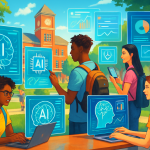The year is 2025. Self-driving cars are (mostly) a thing, your fridge orders groceries before you run out of milk, and everyone’s got at least one AI assistant whispering sweet nothings (or, more likely, scheduling reminders) in their ear. But yesterday, August 7th, the AI landscape shifted. OpenAI, the company that brought us the conversational marvels of GPT-3 and GPT-4, unleashed GPT-5 upon the world. And folks, the hype is real.
Think of it like this: GPT-4 was your incredibly smart college roommate, capable of writing essays, coding simple apps, and holding surprisingly insightful conversations about the philosophical implications of Rick and Morty. GPT-5? That’s your roommate after they’ve gotten their PhD from MIT, interned at Google Brain, and spent a year traveling the world, soaking up knowledge like a digital sponge. This isn’t just an incremental upgrade; it’s a quantum leap forward.
Reuters reported live from the launch event, and the air crackled with anticipation. OpenAI CEO, in a statement that sent ripples through the tech world, described GPT-5 as a “legitimate PhD expert.” This isn’t just marketing fluff. Early benchmarks suggest GPT-5 possesses vastly improved reasoning capabilities, a significantly expanded memory for context, and a fluency in human language that borders on uncanny. Remember those clunky chatbot interactions of yesteryear? Say goodbye. GPT-5 is designed to engage in deeper, more meaningful conversations, making it a game-changer for everything from customer service to scientific research.
But where did this all begin? To understand the magnitude of GPT-5, we need a quick history lesson. It all started with GPT-1, a relatively simple model that could generate text, but often produced nonsensical or repetitive outputs. Then came GPT-2, a massive leap forward that demonstrated the potential of large language models. GPT-3 blew everyone’s minds with its ability to write articles, translate languages, and even generate code. GPT-4 refined these capabilities, adding multimodal input (images, audio) and improving accuracy and reliability. Each iteration built upon the last, culminating in the powerhouse that is GPT-5.
The implications of GPT-5 are far-reaching. Imagine a world where AI assistants can truly understand your needs, anticipate your questions, and provide personalized support in every aspect of your life. Picture doctors using AI to diagnose diseases with unprecedented accuracy, scientists using AI to accelerate drug discovery, and educators using AI to create customized learning experiences for every student. That’s the promise of GPT-5.
Of course, with great power comes great responsibility. The improved reasoning and context awareness of GPT-5 also raise concerns about potential misuse. Could it be used to generate hyper-realistic fake news? To create convincing phishing scams? To automate the spread of misinformation? These are questions that OpenAI and the broader AI community must grapple with as GPT-5 becomes more widely adopted.
Technically, GPT-5’s advancements come from a combination of factors. First, it’s significantly larger than its predecessor, boasting trillions of parameters (the values that the model learns during training). Second, it’s trained on a more diverse and carefully curated dataset, ensuring that it has a comprehensive understanding of the world. Finally, OpenAI has implemented new techniques to improve the model’s ability to reason, plan, and generalize from limited data. Think of it as giving the AI a much bigger brain, a much better education, and the tools to think critically.
The launch of GPT-5 couldn’t have come at a better (or perhaps more precarious) time for OpenAI. The company is riding a wave of unprecedented growth, projected to reach 700 million weekly active users this month. Annualized revenue is on track to triple to a staggering $20 billion by the end of the year. This meteoric rise has propelled OpenAI’s valuation towards $500 billion, a dizzying increase from $300 billion earlier in the year. But as Reuters Breakingviews points out, such rapid growth raises concerns about sustainability. Can OpenAI maintain this momentum? Is its business model truly sustainable in the long run? And what happens if the “key man,” presumably referring to CEO Sam Altman, decides to pursue other ventures?
The financial implications are immense. OpenAI’s success has spurred a frenzy of investment in the AI sector, with venture capitalists pouring billions of dollars into startups developing everything from AI-powered drug discovery platforms to AI-driven marketing tools. The rise of AI is also creating new job opportunities, particularly in areas like AI ethics, data science, and AI engineering. However, it also poses a threat to jobs that can be automated, raising concerns about the future of work. Will we all be replaced by robots, forced to live in a dystopian wasteland ruled by sentient algorithms? Probably not. But the transition to an AI-powered economy will undoubtedly be disruptive, and it’s crucial that we prepare for the challenges ahead.
Beyond the financial and economic considerations, GPT-5 raises profound ethical and philosophical questions. What does it mean to be intelligent? Can a machine truly understand the world, or is it simply mimicking human behavior? As AI becomes more sophisticated, will it eventually surpass human intelligence? And if so, what will be our role in the world? These are questions that have been debated by philosophers and scientists for decades, and the advent of GPT-5 only makes them more urgent.
The launch of GPT-5 is more than just a tech news story; it’s a cultural moment. It’s a reminder of the incredible progress that has been made in artificial intelligence, and a glimpse into the future that awaits us. Whether that future is utopian or dystopian remains to be seen. But one thing is certain: AI is here to stay, and it will continue to shape our world in profound ways. Buckle up, folks. The ride is just getting started.
Discover more from Just Buzz
Subscribe to get the latest posts sent to your email.


